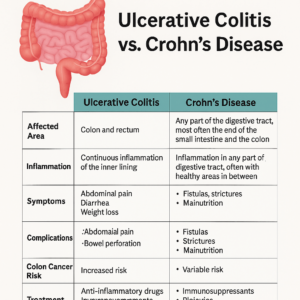
Digestive health problems are becoming more common, and among the most challenging conditions are ulcerative colitis (UC) and Crohn’s disease. Both are types of Inflammatory Bowel Disease (IBD), and while they share some similarities, they also have key differences in how they affect the digestive system. Knowing these differences is essential for getting the right diagnosis, treatment, and long-term care.
In this article, we’ll break down what each condition is, how they differ, their symptoms, diagnosis, and treatment options in a simple, humanized way.
What Is Ulcerative Colitis?
Ulcerative colitis is a chronic disease that causes inflammation and ulcers (sores) in the inner lining of the large intestine (colon) and rectum. Unlike Crohn’s disease, which can affect multiple areas, UC is limited to the colon.
Key Facts:
- It starts in the rectum and may extend upward into the colon.
- The inflammation is continuous (no skipped areas).
- It mainly affects the innermost lining of the intestine.
Common Symptoms:
- Frequent diarrhea, often with blood or mucus
- Abdominal cramps and pain
- Urgency to pass stool
- Weight loss and fatigue
- Fever in severe cases
What Is Crohn’s Disease?
Crohn’s disease is another form of IBD but can affect any part of the digestive tract, from the mouth to the anus. The most common areas affected are the small intestine and the beginning of the colon.
Key Facts:
- It can skip areas, meaning there may be healthy parts between inflamed sections.
- The inflammation goes deeper, affecting all layers of the bowel wall.
- Complications such as fistulas (abnormal connections) and strictures (narrowing) are more common.
Common Symptoms:
- Persistent diarrhea
- Abdominal pain and cramping, especially after meals
- Loss of appetite
- Fatigue and weight loss
- Mouth ulcers or sores
- Severe cases may cause blockages in the intestines
Ulcerative Colitis vs. Crohn’s Disease: The Main Differences
| Feature | Ulcerative Colitis (UC) | Crohn’s Disease |
| Location | Colon and rectum only | Anywhere in digestive tract |
| Inflammation pattern | Continuous | Patchy (skip lesions) |
| Depth of inflammation | Inner lining of the intestine | All layers of the intestinal wall |
| Common complications | Colon cancer, severe bleeding | Fistulas, strictures, malnutrition |
| Surgery | Can be curative (removing colon) | Not curative, disease may recur |
Diagnosis of IBD
Since symptoms often overlap, doctors use several methods to determine whether it’s UC or Crohn’s:
- Blood tests: To check for anemia, inflammation, or infection.
- Stool tests: To rule out infections and detect inflammation markers.
- Colonoscopy/Endoscopy: Directly viewing the intestine with a camera and taking biopsies.
- Imaging tests: CT scans, MRI, or ultrasound to examine the extent of damage.
Correct diagnosis is crucial, as treatment plans differ between the two conditions.
Treatment Options
While there’s no permanent cure for either UC or Crohn’s disease, treatments focus on controlling inflammation, reducing symptoms, and improving quality of life.
1. Medications
- Aminosalicylates (5-ASA drugs): Used more often for UC.
- Corticosteroids: For reducing inflammation during flare-ups.
- Immunosuppressants: To control the immune system’s overreaction.
- Biologics: Advanced medicines that target specific inflammation pathways.
2. Diet and Lifestyle
- Eating smaller, more frequent meals.
- Avoiding trigger foods like spicy or fatty meals.
- Staying hydrated.
- Managing stress with yoga, meditation, or light exercise.
3. Surgery
- In ulcerative colitis, surgery to remove the colon can cure the disease, though it requires lifestyle adjustments.
- In Crohn’s disease, surgery may help manage complications but doesn’t cure the condition, as the disease can return.
Living with UC and Crohn’s
Both conditions can be overwhelming, but with the right care and lifestyle adjustments, people can live fulfilling lives. Support groups, regular check-ups, and personalized treatment plans are essential for long-term management.
It’s also important to note that chronic inflammation in the intestines can sometimes affect the liver. Patients should not ignore signs like jaundice (yellowing of the skin), dark urine, or severe fatigue. In such cases, seeing a liver specialist doctor near me or consulting a trusted dr liver specialist can be just as important as managing bowel health.
Final Thoughts
Ulcerative colitis and Crohn’s disease may sound similar, but they are different in how they affect the digestive system. Knowing the differences helps patients and doctors create better treatment plans and prevent complications.
If you or a loved one is struggling with symptoms of IBD, don’t delay getting medical advice. With proper care, medications, and dietary support, it’s possible to manage these conditions effectively and live a healthier, more balanced life.
